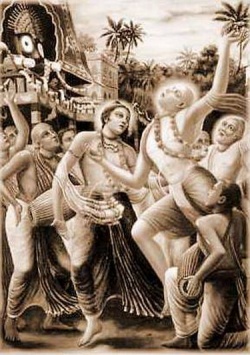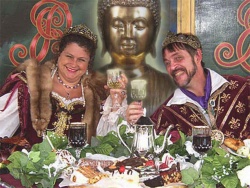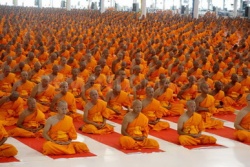Difference between revisions of "RANDY SOGYAL, BEST-SELLING LECHER -- THE WRITINGS OF AMLEARNING 2"
(Created page with "thumb|250px| <poem> January 9, 2004, No. 2 Dear Tara, I just wanted to thank you for your concise and, in my opinion, brilliant summation: "As I get o...") |
|||
| (3 intermediate revisions by 2 users not shown) | |||
| Line 1: | Line 1: | ||
| − | [[File:Image034.jpg|thumb|250px|]] | + | [[File:Image034.jpg|thumb|250px|]]<nomobile>{{DisplayImages|3778|3813|2147}}</nomobile> |
<poem> | <poem> | ||
January 9, 2004, No. 2 | January 9, 2004, No. 2 | ||
| − | Dear Tara, | + | Dear [[Tara]], |
I just wanted to thank you for your concise and, in my opinion, brilliant summation: | I just wanted to thank you for your concise and, in my opinion, brilliant summation: | ||
| − | "As I get older, I appreciate more and more how what happens to us as children affects our whole lives. Just like girls who don't have daddies look for daddy for ever after to worship, boys who don't have mommies look for mommy ever after to torture. Everyone acts according to their power, women submissively, and men aggressively." | + | "As I get older, I appreciate more and more how what happens to us as children affects our whole [[lives]]. Just like girls who don't have daddies look for daddy for ever after to {{Wiki|worship}}, boys who don't have mommies look for mommy ever after to torture. Everyone acts according to their power, women submissively, and men aggressively." |
| − | This has been practically true in my assessment of myself and others in abusive relationships. | + | This has been practically true in my assessment of myself and others in {{Wiki|abusive}} relationships. |
| − | When enough serious damage is done to a child during the formative first 6 years, that child may develop a rigid, all-pervasive personality disorder. These disorders, which are briefly (and rather badly in my opinion) described in the Diagnostic and Statistical Manual (DSM IV for short) (an insurance, legal and medical reference guide to diagnosing mental and emotional illness) can range from the relatively benign, like Dependent Personality Disorder to the truly evil, like Anti-Social Personality Disorder, often called Psychopathic Personality Disorder. | + | When enough serious damage is done to a child during the formative first 6 years, that child may develop a rigid, all-pervasive [[personality]] disorder. These disorders, which are briefly (and rather badly in my opinion) described in the Diagnostic and Statistical Manual (DSM IV for short) (an insurance, legal and {{Wiki|medical}} reference guide to diagnosing [[mental]] and [[emotional]] {{Wiki|illness}}) can range from the relatively benign, like Dependent [[Personality]] Disorder to the truly [[evil]], like Anti-Social [[Personality]] Disorder, often called Psychopathic [[Personality]] Disorder. |
| − | These disorders afflict either gender. More often than not, pathological Narcissism (NPD) is diagnosed in men. Borderline Personality Disorder (BPD) is usually diagnosed in women. | + | These disorders afflict either [[gender]]. More often than not, pathological {{Wiki|Narcissism}} (NPD) is diagnosed in men. Borderline [[Personality]] Disorder (BPD) is usually diagnosed in women. |
| − | I'd say for example that I think Thinley Norbu, Sogyal and Trungpa could be diagnosed as NPD and Jetsunma as BPD. | + | I'd say for example that I think [[Thinley Norbu]], Sogyal and [[Trungpa]] could be diagnosed as NPD and [[Jetsunma]] as BPD. |
| − | The heavier duty personality disorders, the dangerous ones, are called Axis II (personality disorders), Cluster B (pathology). They are: antisocial, borderline, histrionic, narcissistic personality disorders. | + | The heavier [[duty]] [[personality]] disorders, the [[dangerous]] ones, are called Axis II ([[personality]] disorders), Cluster B ({{Wiki|pathology}}). They are: antisocial, borderline, histrionic, narcissistic [[personality]] disorders. |
| − | These all become worse with the co-morbidity of alcohol consumption, which is fashionable among the lamas who put themselves on the ngakpa or 'crazy-wisdom' pedestal, and encourage their male disciples to keep them company in this addiction. | + | These all become worse with the co-morbidity of [[alcohol]] consumption, which is fashionable among the [[lamas]] who put themselves on the [[ngakpa]] or 'crazy-wisdom' pedestal, and encourage their {{Wiki|male}} [[disciples]] to keep them company in this addiction. |
It has been estimated that 18% of the population has Axis II disorders: | It has been estimated that 18% of the population has Axis II disorders: | ||
http://www.healthrising.com/stories/biaxis.html | http://www.healthrising.com/stories/biaxis.html | ||
| − | The people who were not loved well enough by parents who were healthily emotionally available (most of society), but had just enough love to be able to have an integrated but weak true self, are often codependent, which means emotionally shut down, enable abusers, and fit a typical family ecological niche of: | + | The [[people]] who were not loved well enough by [[parents]] who were healthily [[emotionally]] available (most of [[society]]), but had just enough [[love]] to be able to have an integrated but weak [[true self]], are often codependent, which means [[emotionally]] shut down, enable abusers, and fit a typical [[family]] {{Wiki|ecological}} niche of: |
| − | Hero (compulsive caretaker), | + | [[Hero]] (compulsive caretaker), |
Scapegoat (Rebel-Addict), | Scapegoat (Rebel-Addict), | ||
| − | Lost Child (Invisible Space Cadet), and | + | Lost Child ({{Wiki|Invisible}} [[Space]] Cadet), and |
| − | Mascot (Performer-Keep 'Em Laughing) | + | Mascot (Performer-Keep 'Em {{Wiki|Laughing}}) |
| − | have all tendencies to attach themselves to emotionally abusive people, either male or female, or both, in either love, friendship, career or spiritual relationships. | + | have all {{Wiki|tendencies}} to attach themselves to [[emotionally]] {{Wiki|abusive}} [[people]], either {{Wiki|male}} or {{Wiki|female}}, or both, in either [[love]], [[friendship]], career or [[spiritual]] relationships. |
| − | In the case of spiritual seekers, who attach themselves to a Narcissist guru/lama as their devotee, I'd call that Narcissist-Codependent, or NCo, for short. | + | In the case of [[spiritual]] seekers, who attach themselves to a Narcissist guru/lama as their [[devotee]], I'd call that Narcissist-Codependent, or NCo, for short. |
| − | Narcissist Codependents, I'd speculate, are the children of narcissistic parents, adult children of alcoholics, or parents who were abusive in one way or another, either engulfingly controlling, or using their child to get their own wounded needs met. Often the adult children were their mother's confidante, caretaker, a surrogate spouse emotionally, and their mother's 'friend', instead of having a genuinely parental mother. Or else they are commonly the blamed, devalued child. Their father might be a beeraholic, workaholic, rageaholic, or just not there. Or an Army whip-cracker. Or an incest perpetrator. Emotional and physical abuse can take many different forms. | + | Narcissist Codependents, I'd speculate, are the children of narcissistic [[parents]], adult children of alcoholics, or [[parents]] who were {{Wiki|abusive}} in one way or another, either engulfingly controlling, or using their child to get their [[own]] wounded needs met. Often the adult children were their mother's confidante, caretaker, a surrogate spouse [[emotionally]], and their mother's '[[friend]]', instead of having a genuinely parental mother. Or else they are commonly the blamed, devalued child. Their father might be a beeraholic, workaholic, rageaholic, or just not there. Or an {{Wiki|Army}} whip-cracker. Or an [[incest]] perpetrator. [[Emotional]] and [[physical]] abuse can take many different [[forms]]. |
| − | Alice Miller's excellent (although written in somewhat antiquated English) book called, "The Drama Of The Gifted Child," can be really helpful in seeing these issues more clearly. | + | Alice Miller's {{Wiki|excellent}} (although written in somewhat antiquated English) [[book]] called, "The Drama Of The Gifted Child," can be really helpful in [[seeing]] these issues more clearly. |
| − | There are a lot of typical dysfunctional family scenarios that leave deep scars on the children who grow up in these environments. Adult children of dysfunctional families are more likely to become cult devotees, with girls who don't have daddies looking a for daddy for ever after to worship and boys who don't have mommies looking for mommy ever after to torture. As you said so poignantly, "Everyone acting according to their power, women submissively, and men aggressively." | + | There are a lot of typical dysfunctional [[family]] scenarios that leave deep scars on the children who grow up in these environments. Adult children of dysfunctional families are more likely to become {{Wiki|cult}} {{Wiki|devotees}}, with girls who don't have daddies looking a for daddy for ever after to {{Wiki|worship}} and boys who don't have mommies looking for mommy ever after to torture. As you said so poignantly, "Everyone acting according to their power, women submissively, and men aggressively." |
| − | Although I have to say that in Tibetan Buddhist cult environments, I've seen the passivity in male devotees as well as in women; the devotees often expressing their unresolved issues in passive aggression. | + | Although I have to say that in [[Tibetan Buddhist]] {{Wiki|cult}} environments, I've seen the passivity in {{Wiki|male}} {{Wiki|devotees}} as well as in women; the {{Wiki|devotees}} often expressing their unresolved issues in passive [[aggression]]. |
</poem> | </poem> | ||
{{R}} | {{R}} | ||
[http://www.american-buddha.com/am.learn.5.htm www.american-buddha.com] | [http://www.american-buddha.com/am.learn.5.htm www.american-buddha.com] | ||
| − | [[Category: | + | |
| + | [[Category:Corruption in the Tibetan Buddhist community]] | ||
Latest revision as of 04:39, 26 February 2016
January 9, 2004, No. 2
Dear Tara,
I just wanted to thank you for your concise and, in my opinion, brilliant summation:
"As I get older, I appreciate more and more how what happens to us as children affects our whole lives. Just like girls who don't have daddies look for daddy for ever after to worship, boys who don't have mommies look for mommy ever after to torture. Everyone acts according to their power, women submissively, and men aggressively."
This has been practically true in my assessment of myself and others in abusive relationships.
When enough serious damage is done to a child during the formative first 6 years, that child may develop a rigid, all-pervasive personality disorder. These disorders, which are briefly (and rather badly in my opinion) described in the Diagnostic and Statistical Manual (DSM IV for short) (an insurance, legal and medical reference guide to diagnosing mental and emotional illness) can range from the relatively benign, like Dependent Personality Disorder to the truly evil, like Anti-Social Personality Disorder, often called Psychopathic Personality Disorder.
These disorders afflict either gender. More often than not, pathological Narcissism (NPD) is diagnosed in men. Borderline Personality Disorder (BPD) is usually diagnosed in women.
I'd say for example that I think Thinley Norbu, Sogyal and Trungpa could be diagnosed as NPD and Jetsunma as BPD.
The heavier duty personality disorders, the dangerous ones, are called Axis II (personality disorders), Cluster B (pathology). They are: antisocial, borderline, histrionic, narcissistic personality disorders.
These all become worse with the co-morbidity of alcohol consumption, which is fashionable among the lamas who put themselves on the ngakpa or 'crazy-wisdom' pedestal, and encourage their male disciples to keep them company in this addiction.
It has been estimated that 18% of the population has Axis II disorders:
http://www.healthrising.com/stories/biaxis.html
The people who were not loved well enough by parents who were healthily emotionally available (most of society), but had just enough love to be able to have an integrated but weak true self, are often codependent, which means emotionally shut down, enable abusers, and fit a typical family ecological niche of:
Hero (compulsive caretaker),
Scapegoat (Rebel-Addict),
Lost Child (Invisible Space Cadet), and
Mascot (Performer-Keep 'Em Laughing)
have all tendencies to attach themselves to emotionally abusive people, either male or female, or both, in either love, friendship, career or spiritual relationships.
In the case of spiritual seekers, who attach themselves to a Narcissist guru/lama as their devotee, I'd call that Narcissist-Codependent, or NCo, for short.
Narcissist Codependents, I'd speculate, are the children of narcissistic parents, adult children of alcoholics, or parents who were abusive in one way or another, either engulfingly controlling, or using their child to get their own wounded needs met. Often the adult children were their mother's confidante, caretaker, a surrogate spouse emotionally, and their mother's 'friend', instead of having a genuinely parental mother. Or else they are commonly the blamed, devalued child. Their father might be a beeraholic, workaholic, rageaholic, or just not there. Or an Army whip-cracker. Or an incest perpetrator. Emotional and physical abuse can take many different forms.
Alice Miller's excellent (although written in somewhat antiquated English) book called, "The Drama Of The Gifted Child," can be really helpful in seeing these issues more clearly.
There are a lot of typical dysfunctional family scenarios that leave deep scars on the children who grow up in these environments. Adult children of dysfunctional families are more likely to become cult devotees, with girls who don't have daddies looking a for daddy for ever after to worship and boys who don't have mommies looking for mommy ever after to torture. As you said so poignantly, "Everyone acting according to their power, women submissively, and men aggressively."
Although I have to say that in Tibetan Buddhist cult environments, I've seen the passivity in male devotees as well as in women; the devotees often expressing their unresolved issues in passive aggression.



